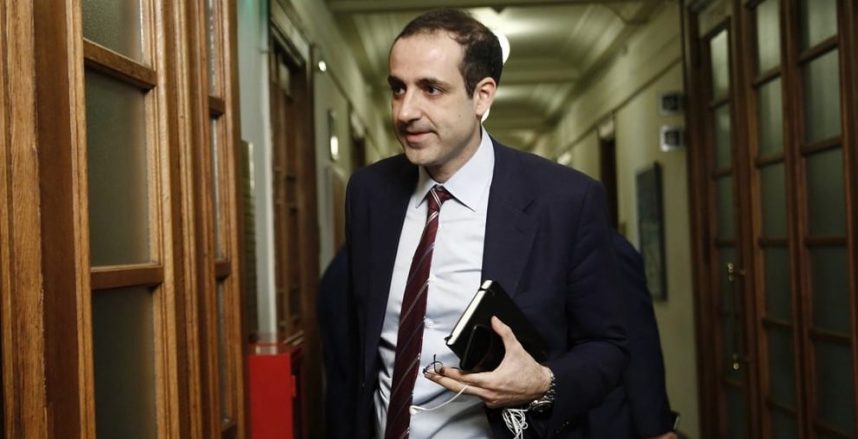
Greek journalists’ union slates barrage of legal actions filed against media and journalists by the former secretary of the Prime Minister concerning the wiretapping scandal.

Grigoris Dimitriadis, nephew and former secretary of Greek Prime Minister Kyriakos Mitsotakis, filed exorbitant strategic lawsuits against public participation or SLAPPs against media and journalists over reports about the wiretapping scandal known as “Predator-gate”, in which he is allegedly involved, a union said.
The Journalists’ Union of Athens daily newspapers, ESIEA, on Thursday claimed Dimitriadis “unleashed a flurry of new lawsuits against many journalists and the media and with exorbitant and exterminating claims”, to intimidate journalists and limit access to information.
Dimitriadis sent lawsuits to the media outlet Efimerida ton Syntakton, EfSyn, the media group Alter Ego and to journalist Dimitris Terzis, and for a second time to journalists Thanasis Koukakis, Nikolas Leontopoulos, Thodoris Chondrogiannos and Christoforos Kasdaglis.
In August 2022, Dimitriadis resigned following revelations of his alleged involvement with Intellexa, a company that sells Predator, an illegal spyware in Greece.
He denied wrongdoing and sued the media involved – Reporters United, EfSyn, as well as the journalist Koukakis, whose phone was infected with Predator.
His resignation was followed by that of the head of the National Intelligence Service, EYP, Panagiotis Kontoleon.
The wiretapping scandal, which has occupied the Greek media since 2022, concerns the use of Predator to monitor or attempt to monitor journalists, politicians and other public figures.
Dimitriadis now accuses Koukakis of indulging in systematic defamation of him through X [formerly Twitter] by reproducing articles insulting him over the wiretapping scandal. He is seeking 300,000 euros plus an extra 1,000 euros per day if he does not withdraw his tweets
“It is no coincidence that Dimitriadis is suing journalists and media at a time when important aspects of the wiretapping scandal are being revealed,” Koukakis told BIRN.
“The specific revelations reveal the role he played in the case in a period when he was responsible for Greece’s national intelligence service. The journalists involved in covering this unprecedented scandal they are not daunted or discouraged from such practices and are providing Greek justice with new evidence on a daily basis,” he added.
Dimitriadis filed a second legal action against EfSyn and the journalists Nikolas Leontopoulos, Thodoris Chondrogiannos and Christoforos Kasdaglis, members of the investigative media outlet Reporters United, over EfSyn’s cover of November 3 regarding the wiretapping scandal.
It wrote that Dimitriadis’ mobile phone number was used to infect 11 people with Predator.
The former PM’s secretary has demanded 2.45 million euros in compensation for the moral damage which he claims to have suffered.
“The investigation by EfsYn and Reporters United on the wiretapping scandal is a matter of public interest as it concerns democracy and the rule of law in Greece. Dimitriadis decided, instead of giving more answers, to proceed with legal actions before and after the publications and to file lawsuits. However, all these will not silence us,” Chondrogiannos told BIRN.
EfSyn and its journalist Dimitris Terzis received another legal action from Dimitriadis over the publications in the print edition and on the efsyn.gr website that followed the November 3 report.
“Both on the front page of 3/11 and in the related publications of our printed and electronic edition up to 8/11, there is neither the intention nor the suggestion of a slanderous reference,” stated EfSyn in a written announcement.
“Neither in the original publication nor in what followed in the wake of the original is it stated that the SMS were sent by Dimitriadis himself. It is reported that infected Predator messages were sent to 11 recipients using his mobile phone number,” it added.
The Council of the European Union announced on November 30 that it had reached a provisional agreement with the European Parliament over a directive designed to protect journalists and human rights defenders from abusive court proceedings, such as SLAPPs.